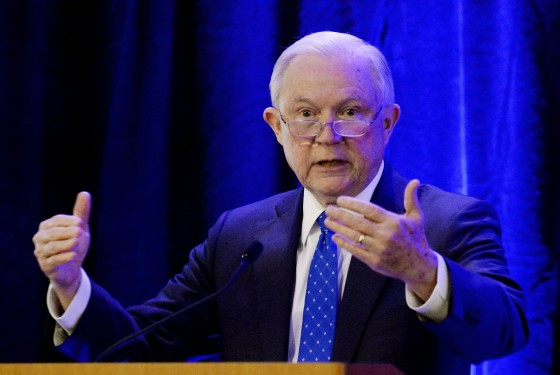Attorney General Jeff Sessions told a meeting of international police chiefs Thursday that communities need the option of "involuntary commitment" for people who suffer from mental illnesses as a crime-fighting tool.
"We have got to finally make progress on this seemingly intractable problem. Local communities supported by the federal government have to have a system that actually delivers valuable information, with involuntary commitment options for those who are mentally ill and dangerous. Some of these people need to be in treatment facilities, not in jails," Sessions said, according to his prepared remarks.
He told the crowd that he had discussions with law enforcement experts at the Justice Department last week, and the conversation turned to "the problem of individuals who are mentally ill or particularly dangerous and how to handle these cases."
His speech largely focused on bridging the relationship between law enforcement officers at every level and working together to improve gun safety measures, such as background checks, and "protect law-abiding people and disarm criminals."
Sessions also said the Justice Department would offer more resources to help local officials access important records that could potentially keep guns out of the hands of dangerous individuals.
"We will provide funding for increasing accessibility to criminal records — especially domestic violence convictions — as well as records of firearm restrictions related to mental illness," he said.
In the wake of the Valentine's Day shooting at a Parkland, Florida, high school that left 17 people dead, Sessions said he wanted the Justice Department study how mental illness and gun violence intersect and figure out how law enforcement can use existing laws to intervene before a school shooting happens.
Broward County Mayor Beam Furr told NPR last month that the alleged Parkland shooter, 19-year-old Nikolas Cruz, had shown signs of mental illness and "had been a client at some mental health facilities."
President Donald Trump, who has been critical of the law enforcement response to the shooting, also made the mental health of the alleged shooter a focal point, calling him "mentally disturbed."
Trump and other Republicans have consistently framed recent mass shootings as symptoms of a mental health crisis, despite pushback from the mental health community and mass shooting experts, who say the belief that the mentally ill are more likely to commit a mass shooting is misleading and dangerous.
After 26 died in a shooting at a church in Sutherland Springs, Texas, Trump said, "mental health is your problem here" and called the shooter "a very deranged individual."
The Texas church shooter, who had been discharged from the military for bad conduct, shouldn't have been able to legally own a gun — not because of a prohibitive record of mental illness, but as a result of human error. The Air Force failed to enter his domestic violence court-martial conviction into the national background check database.
